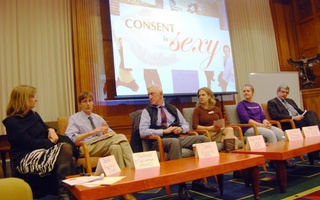Each Tuesday, a group of 30 College administrators convene in Lamont Library. Seated in the third floor conference room, they weigh in on everything from routine requests from students—permission to study abroad or activate advanced standing—to the most serious allegations of academic misconduct.
The Administrative Board, as the group of deans and faculty members is known, has remained mostly unchanged since its founding in 1890. But two major policy changes, approved in the span of just two months earlier this year, are set to overhaul its jurisdiction and rework its purpose by next fall.
Three years ago, for instance, the College’s top judicial body heard 271 disciplinary cases. Eighty-three of those—almost a third—were related to academic dishonesty, while three were cases of alleged sexual misconduct, according to statistics on the Board’s website.
Come next fall, though, after the College’s first honor code goes into effect, the Board will no longer hear the vast majority of such cheating cases, if any. Sexual assault allegations have already been removed from the body’s investigatory purview with this academic year’s implementation of Harvard’s first-ever University-wide sexual harassment policy.
The Ad Board’s function is changing fundamentally. This time next year, the body that previously governed all the major facets of student life will no longer have the same control over the College’s handling of two issues that have most recently dominated campus discourse.
“They’ll probably spend less time together on Tuesday afternoons,” said Donald H. Pfister, former interim dean of the College and Ad Board chair.
LIGHTENING THE LOAD
Recent scrutiny into the Ad Board’s handling of cheating and sexual assault cases would have you believe that all its work is disciplinary. Amid 2012’s Government 1310 cheating scandal, critics called the Board opaque and unfair. And as the federal government opened an investigation into the College’s adherence to anti-sex discrimination law Title IX last spring, it came under fire once more.
Much of what the Board does day-to-day, however, is less controversial. It hears academic review cases, which involve students who have earned unsatisfactory grades or have otherwise failed to meet academic requirements. In 2011-2012, the Ad Board heard 385 such cases.
The Ad Board also processes petitions for exceptions to academic policies, like those governing simultaneous enrollment. Those petitions take less time to resolve, but the Board hears many of them—1,595 in 2011-2012.
{shortcode-703cb86cb8703feceecd6fecd65e3c2d7c5103a2}
The most recent publicly available statistics on the Ad Board’s caseload are from 2012-2013, but those numbers are not representative because that year saw the adjudication of the College’s largest cheating scandal in recent memory.
That cheating scandal accelerated the Academic Integrity Committee’s efforts to propose the College’s first honor code, which will establish a distinct student-faculty judicial body to adjudicate academic integrity cases starting next fall. The several members of the Ad Board who sit on the Academic Integrity Committee, including Dean of Undergraduate Education Jay M. Harris, had a hand in shaping the policy that will siphon off the Board’s role in academic dishonesty cases.
Around the same time, a working group that included former Ad Board Secretary John “Jay” L. Ellison wrote and released a new policy governing Harvard’s handling of sexual harassment, which includes sexual assault. That policy and its accompanying procedures created the Office for Sexual and Gender-Based Dispute Resolution, a central body that now investigates sexual harassment complaints from any student across the University, removing sexual misconduct investigations from the Ad Board’s caseload.
With these changes, the Ad Board will continue to hear some discipline cases—most “social” discipline cases, like those involving drugs and alcohol—and it will still hand down sanctions in sexual assault cases, though the ODR will investigate them first. And it will no longer hear most, if any, cheating cases, which in 2011-2012 accounted for 26 of the 35 disciplinary cases that required students to withdraw temporarily from the College.
Read more in College News
Coursera Co-Founder Promotes 'Deep Learning' at SEASRecommended Articles
-
 In Wake of Amherst, Panel Examines Sexual Assault
In Wake of Amherst, Panel Examines Sexual Assault -
With Investigation Complete, Harvard Plans a Cheating Scandal AnnouncementHarvard has delivered verdicts to all of the approximately 125 students ensnared in the Government 1310 cheating scandal and plans to make an announcement about the results of the investigation near the start of the spring semester, according to a Harvard spokesperson.
-
Release of Ad Board Case Database Remains DelayedNearly two and a half years after its originally slated release date, a database intended to increase the transparency of the Administrative Board process has yet to be made public.
-
Ad Board Cheating Statistics from Year That Saw Gov 1310 Yet To Be Made PublicThe unreleased statistics are expected to show a number of forced withdrawals in academic dishonesty cases at least three-and-a-half times higher than the previous five-year average of 21.
-
 Op-Ed Draws Attention to 20-Year-Old FAS Policy
Op-Ed Draws Attention to 20-Year-Old FAS Policy -
2012-2013 Ad Board Stats Reflect Three-Fold Spike in Academic Dishonesty CasesAccording to the statistics, 97 students involved in academic integrity cases were required to withdraw in 2012-2013, the year that saw Harvard’s largest cheating investigation in recent memory.













